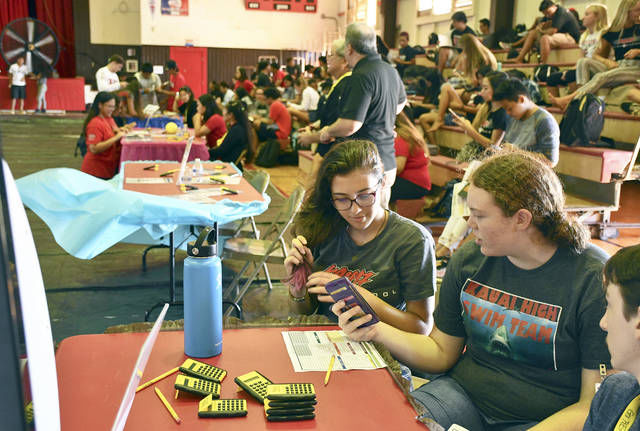LIHUE — Don’t let your wife buy yarn is the advice offered by Dade Andrews, a Kauai High School senior Monday morning.
Andrews had just drawn a $50 liability against his spendable income on the Reality Wheel because his wife took up knitting.
“She makes more money than I do,” Andrews said. “Why can’t she buy her own yarn or pay for the class?”
Tehani Bernhardt of Kauai Community Federal Credit Union said there are things in life which are unexpected — like having a baby.
“There needs to be adoption centers set up,” said Taegan Keep, another senior at Kauai High School. “I have two children. My husband works, I work two jobs, and we’re still not making it by about $150 a month.”
Marley Harrington, another Red Raider senior, sympathized with Keep’s predicament.
“She has to have a house,” Harrington said. “I can get by with a studio because it’s just me, my husband, a child, and my dog. But she has two kids and needs a house. Do you know how much more that is?”
KCFCU, in partnership with community organizations, hosted its reality fair geared toward learning financial literacy.
“I like it,” Keep said. “I’m learning a lot of things, like it’s expensive having kids, and it’s more expensive if they’re young.”
Greg Anderson, business instructor at Kauai High School and adviser for the student credit union hosted by KCFCU, said the virtual fair gives students an opportunity to look at life.
“They’re finding out things are expensive,” Anderson said. “They learn how to prioritize. I wish we had a program like this when I was in school. This is better than spending hours talking to students. As an example, health insurance is expensive, and there is not too much talk about that.”
Terri Kaniho, KCFCU marketing specialist, agreed.
“These reality fairs are super huge and have great impact for our schools, for our community,” Kaniho said. “It’s like events where you have to look at admission costs and what you’re going to be spending. Sometimes, it’s cheaper to just take the kids to the mall.”
Students are issued spendable income based on a profession they choose. They visit the different stations at the virtual fair and have to deal with expenses that chew away at the income pie.
On the other side of the wheel, Allan Bueno scored an additional $425 by selling his baseball card collection.



